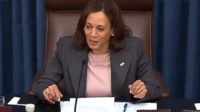Sen. Joe Manchin (D-W.Va.) and Senate Majority Leader Charles Schumer (D-N.Y.) reached a deal late on July 27 that will infuse billions of dollars in energy infrastructure projects and cut U.S. carbon emissions by 40% over the next decade if it is enacted into law.
The new bill—the result of an apparent change-of-heart by Manchin who almost single-handedly killed months ago the more wide-ranging Build Back Better Act favored by President Joe Biden—is being heralded by environmental and clean energy advocates who had all but given up hope that Congress would pass meaningful legislation to address the climate crisis this year.
Earlier in July, Manchin had also said he would not support the scaled down bill, claiming it was inflationary.
Although GOP lawmakers and some business groups say they oppose the bill because of its labor and tax provisions, Senate Democrats hope to clear it using the budget reconciliation process—which only requires a simple majority to pass—before August recess.
Climate-Related Provisions
The new bill includes $369 billion for carbon-emissions and other climate-related infrastructure projects but is more narrowly focused than the stalled Build Back Better bill, which environmental advocates considered a necessary companion to the Infrastructure Investment and Jobs Act (IIJA), which they saw as more focused on advancing projects than on tackling climate change.
The Manchin-Schumer package “is not the bill we would have written,” said Manish Bapna, president and CEO of the Natural Resources Defense Council, in a statement. “But this is a package we can’t afford to reject ... Congress must pass it without delay,” he said.
The bill. dubbed the Inflation Reduction Act of 2022, also includes provisions related to the Affordable Care Act and environmental justice.
Steve Hall, vice president of government affairs for the American Council of Engineering Cos., says that although the 15% corporate minimum tax rate could potentially affect some larger group members, on balance there are many more positives than negatives in the bill.
Among provisions ACEC supports are the ten-year extension of production tax credits for renewable and carbon-reduction projects, $3 billion in competitive grants for transportation projects and a commitment to make additional reforms to the project permitting process—an underlying concern in implementng IIJA-funded projects.
“I don’t know if we are seeing hard tangible evidence yet of project slowdowns, but there’s a lot of worry,” Hall told ENR. “This is a lot of money and our client agencies are stretched to the limit to oversee and manage these projects.”
Emily Feenstra, the American Society of Civil Engineers’ chief of policy and external affairs, says the package takes into account the impacts of climate change on U.S. infrastructure. “Recent power outages and reliability issues due to severe storms and nationwide heat waves underscore the ongoing need to prepare for new realities,” she said in an email to ENR.
ASCE is not taking a position on the bill overall, but “elements like funding for transmission planning and construction to connect to new sources of renewable energy and incentives for low-embodied carbon construction materials would help leverage the impact of the IIJA funding that is starting to flow to states and cities,” she said.
Madelyn Morrison, manager of external affairs for the Carbon Capture Coalition, says the group favors the seven-year extension of the 45Q tax credit, which would now be available for any carbon capture, direct-air capture and carbon utilization projects that breaks ground before Jan. 1, 2033.
“This legislation, coupled with the groundbreaking carbon management provisions included in the bipartisan infrastructure law, could deliver an estimated 13-fold increase in deployment of carbon management technologies and between 210 and 250 million metric tons of annual emissions reductions by 2035," she said in a statement.
The bill also includes $10 billion in investment tax credits to build technology manufacturing facilities for electric vehicles, wind turbine and solar panel production.
Joe Britton, executive director of the Zero Emissions Transportation Association, told ENR that although the bill is smaller than the Build Back Better Act, it "refocuses the lens through which we see our joint goals of driving down prices for domestic manufacturing and achieving our emission reduction goals.”
The bill would need to pass the House before it would be signed by President Joe Biden, who says he supports the measure.
Bill Still Has Opponents
The Manchin-Schumer bill has its critics, including the U.S. Chamber of Commerce, which opposes the corporate tax increase, and lawmakers who say it would have negative effects on the economy.
Some construction groups, including the Associated General Contractors of America and the Associated Builders and Contractors, oppose the requirement that a certain percentage of the workforce on bill-funded projects come from registered apprenticeship programs, the majority of which are union-affiliated.
Kristen Swearingen, ABC vice president of legislative and political affairs, said in a statement, “This bill delivers political favors to the president’s and Democrats’ labor backers, penalizing employers that believe in fair and open competition and pay wages based on experience, quality and market rates and limiting opportunities for thousands of industry-skilled apprentices.”
She added that its corporate tax hikes could affect association members and result in higher construction materials costs, which have already increased by 20% over the past year.






Post a comment to this article
Report Abusive Comment